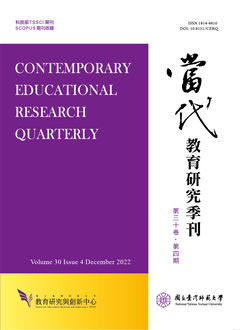

2001 年中國進行了基礎教育課程改革,而使其政治課及道德課程有了大幅度的轉變,然而其內涵為何,目前的研究仍十分有限。本研究透過詮釋性的文本分析檢視現行中國的初中及小學公民教科書,並從政治學的觀點發現「制度化」及「中國民族主義」對這些教科書的影響,其效果可使中共之「威權韌性」得以強化。從政治社會化的角度觀之,教科書透過現代化的公民教育課程內容及方法使中共執政的說服力加強;教科書在進步的課程中包裝愛國等於愛中華民族,又等於愛黨的觀念,激發中國民族主義,使新一代的中國人民相信必須支持中共政權才能促使國家富強與統一。本文認為中共政權的韌性代表中國的公民培養在一些重要的價值觀點上─非賦權的自由民主觀念、犧牲個人完成集體的價值、國家民族至上的觀念、愛中國共產黨的思想等,仍與臺灣的公民教育具有本質上的差異。而臺灣政府及民眾必須瞭解中國在開放政策下的公民教育本質,以思考如何與其交流,尋求兩岸的和平與自由。
China launched its Basic Education Reform in 2001, which made greatchanges in its political and moral education. Using the interpretive text analysismethod, this study examines current Chinese elementary and junior-highschool civics textbooks, and explains how “institutionalization” and “Chinesenationalism” have significant effects on the textbooks that strengthen theauthoritarian resilience of the Chinese Communist Party (CCP). From thepolitical socialization point of view, the textbooks not only legitimize the CCPrule by the modernized and progressive civics curricula and methods, but serveto equate ideas of loving the state, loving the Chinese nation, and loving the CCPfor the purpose of promoting Chinese nationalism, so that the new generationmay believe that they should support the regime in order to be wealthy, strongand unified. This paper argues that the authoritarian resilience of CCP impliesthat China’s citizenship education will continue to be different from Taiwan’sin significant ways: the non-empowering ideas of democracy, the value of selfsacrificefor the collective, the notion of upholding the nation-state above theindividual, and the idea of loving CCP. I believe that Taiwan needs to know thenature of China’s citizenship education in its open policy, and think about how tointeract with it for peace and freedom across the Taiwan Strait.

本著作係採用創用 CC 姓名標示-非商業性 3.0 台灣 授權條款授權.
本刊國立台灣師範大學教育研究與創新中心
106台北市和平東路一段162號 | 電話: 02-7749-3670 | E-mail: cerecerq@gmail.com
教創中心 | 師大 | 電子報 | 線上投審系統
本刊由國家科學及技術委員會人文社會科學研究中心補助經費
© 2014 CERI-NTNU
